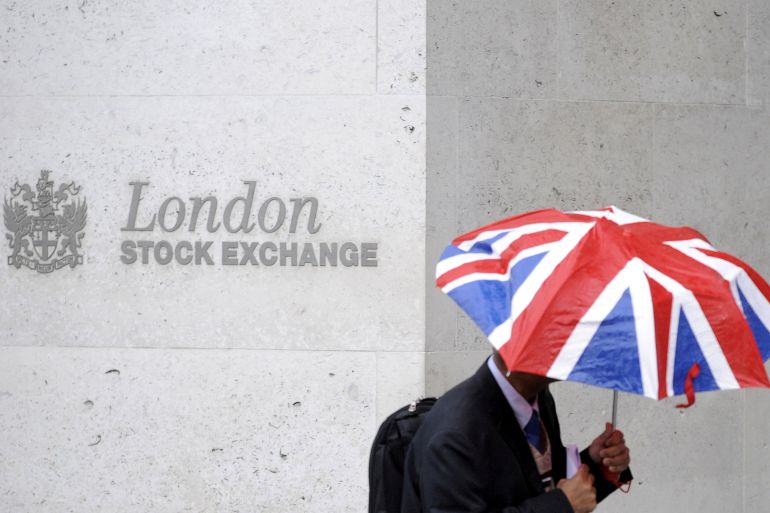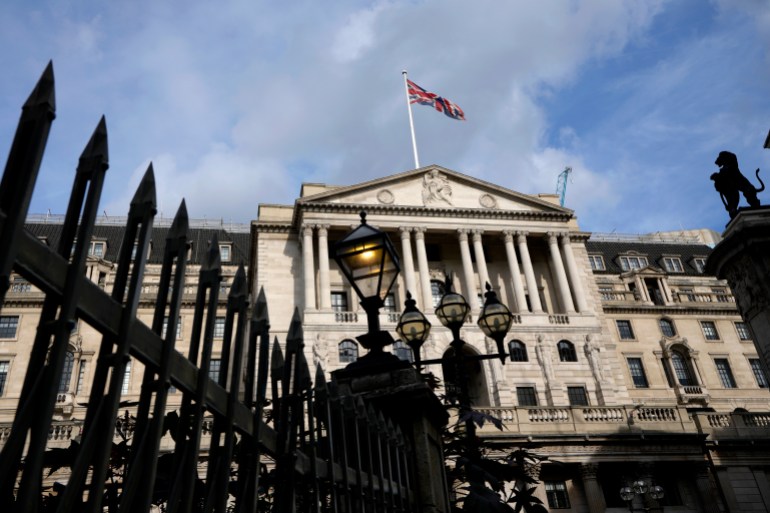UK stocks, sterling slip as BoE intervenes after IMF slams budget
The pound slumps and stocks pare losses after the Bank of England says it is buying up long-dated UK government bonds.

The Bank of England has stepped in to shore up market confidence in the UK after the International Monetary Fund criticised Britain’s inflation-fighting budget.
Reacting to market turmoil, the BoE announced on Wednesday it was temporarily buying up long-dated UK government bonds “to restore orderly market conditions”.
Keep reading
list of 3 itemsUK’s first Black chancellor inherits ‘once-in-a-lifetime’ crisis
UK lifts ban on fracking for shale gas
However, the British pound promptly slumped 1.7 percent to $1.0552 and UK stocks pared some of their sharp losses.
The blue-chip index slipped 0.3 percent after dropping as much as 2.1 percent earlier in the session, while the more domestically focused FTSE 250 eased 1.4 percent.
The BoE intervention followed criticism on Tuesday from the IMF, which argued that Britain’s budget could increase inequality and worsen inflation.
Credit ratings agency Moody’s also waded in overnight with a warning about soaring debt.
Big tax cuts
Chancellor of the Exchequer Kwasi Kwarteng’s big tax cuts and energy price freeze, aimed at boosting the UK’s recession-threatened economy, appeared to have had the opposite effect as traders warn of ballooning debt to pay for the incentives.
Following last Friday’s budget, UK government bond yields have soared and the pound hit a record low at $1.0350.

Critics added that Kwarteng’s measures would benefit the rich more than the poorest, as millions of Britons suffer from a cost-of-living crisis.
“We have acted at speed to protect households and businesses through this winter and the next, following the unprecedented energy price rise,” the Treasury said as it sought to defend itself.
“We are focused on growing the economy to raise living standards for everyone,” it added, blaming sky-high oil, gas and electricity prices on Russia’s full-scale invasion of Ukraine.
IMF’s criticism
In a highly unusual intervention, the IMF late Tuesday said it was “closely monitoring” developments and urged the government in London, led by new Prime Minister Liz Truss, to change tack.
The Fund added: “We understand that the sizable fiscal package announced aims at helping families and businesses deal with the energy shock and at boosting growth via tax cuts and supply measures.
“However, given elevated inflation pressures in many countries … we do not recommend large and untargeted fiscal packages at this juncture.”
The IMF said the “UK measures will likely increase inequality” and stressed the importance of fiscal policy not working “at cross purposes to monetary policy”.
Analysts warned that Britain’s controversial measures could force the Bank of England to hike interest rates far higher than forecast.
“Expectations that there will be a super-size interest rate hike coming from the Bank of England to try and counter the government splurge on tax cuts and spending have increased,” Hargreaves Lansdown analyst Susannah Streeter told AFP on Wednesday.